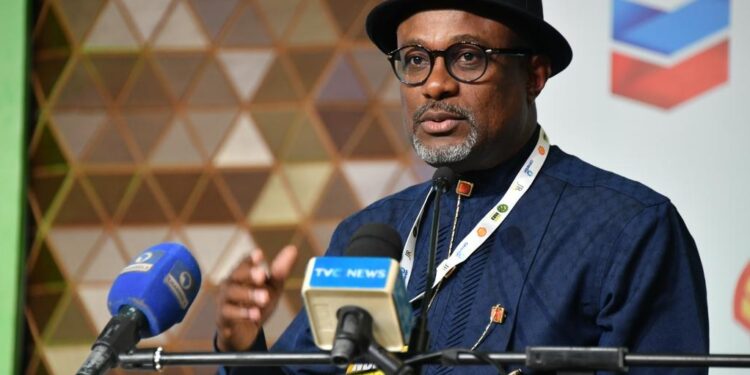By John Ikani
The Nigerian Content Development and Monitoring Board (NCDMB) has dismissed a news report that falsely claimed its Executive Secretary, Mr. Simbi Kesiye Wabote, asserted that international oil companies (IOCs), including Shell, “were no longer interested in investing in the country.”
In a statement released by NCDMB’s Manager of Corporate Communications, Mr. Esueme D Kikile in Yenagoa, the report was labelled as inaccurate and “a failure to understand the current context and nuances of the Nigerian oil and gas industry, which Engr. Wabote tried to explain in his Goodwill Message at the recently concluded 2023 NAPE conference”
“The existence of challenges does not translate to the bleak scenario painted in the report, which certainly does not represent the views of NCDMB or its leadership. In fact, the tone of the ES message was very positive in discussing the challenges.
“The NCDMB is constantly engaging in candid discussions with stakeholders, including the IOCs, in a dynamic and often challenging sector. Protecting Nigeria’s best interests is our constant focus as we strive to balance the imperatives of keeping the sector investor-friendly with the current and future priorities of the country,” clarified Mr. Kikile.
The rebuttal, titled “Misrepresentation of goodwill message made by Executive Secretary, NCDMB, Engr. Simbi Kesiye Wabote at 2023 NAPE conference” reads:
“It has come to our attention that some media reports on comments made by the Executive Secretary of the Nigerian Content Development and Monitoring Board (NCDMB), Engr. Simbi Kesiye Wabote at the recent 41st Annual International Conference and Exhibition of the Nigerian Association of Petroleum Explorationists (NAPE), in Lagos contained significant misrepresentations and distortions.
“The report distorted Engr. Wabote’s privileged comments, and reached an imaginary conclusion that suggests that ShellPetroleum Development Company (SPDC) has withdrawn from the Memorandum of Understanding (MoU) it signed with the NCDMB, the Nigerian National Petroleum Company (NNPC) Limited and four other international oil companies (IOCs) towards shortening the contracting cycle, ramping up Nigeria’s crude oil production and ensuring compliance with the provisions of the Nigerian Oil and Gas Industry Content Development (NOGICD) Act.
“As a professional and rigorous institution with a commitment to the sharing of accurate information, it is necessary that we clarify the real facts and substance of his comments at the event in the interest of stakeholders, including investors.
“Contrary to the impression in the report, the ES did not participate in any panel discussion at the Conference; his comments were captured in his Goodwill Message, copies of which were shared at the event.In it, he touched on various issues critical to the good health of the local and global energy sector. His comments, essentially a rallying cry to the nation’s petroleum explorationists, included:
A. Addressing the Energy Trilemma – achieving an appropriate balance between energy security, sustainability, and affordability.
B. The central role of Nigerian petroleum explorationists in addressing key questions in future energy dynamics.
C. The continued relevance of the oil and gas industry as a key pillar of global energy powering industrial and economic developments across the world.
D. The urgent need for the nation to increase the component of renewable energy in its energy mix and the central role of petroleum explorationists in achieving this imperative.
E. How the resurgence in the issuance of licenses for exploration and development of oil and gas in the North Sea is affecting global energy dynamics and why Nigeria needs to work harder to remain relevant.
“Second, the statement in the report – “the IOCs, especially Shell, were no longer interested in investing in the country” attributed to Engr. Wabote is inaccurate. It is, at best, a failure to understand the current context and nuances of the Nigerian oil and gas industry which Engr. Wabote tried to explain in his Goodwill Message. The existence of challenges does not translate to the bleak scenario painted in the report which certainly does not represent the views of NCDMB or its leadership. In fact, the tone of the ES message was very positive in discussing the challenges.
“The NCDMB is constantly having frank discussions with stakeholders, including the IOCs in a dynamic and often challenging sector. Protecting Nigeria’s best interests is our constant focus as we try to balance the imperatives of keeping the sector investor-friendly with the current and future priorities of the country.
“The NCDMB equally seizes the opportunity to refute the comments attributed to the Executive Vice President (Upstream), NNPC, Mrs. Oritsemeyiwa Eyesan, to the effect that the implementation of the NOGICD Act has led to the return of portfolio managers or companies, rather than the development of local competences and capabilities.
“NCDMB, as a regulatory agency does not select contractors for the operators. The role of NCDMB in the tender management process is to ensure that the operators and their Joint Venture (JV) partners comply with the provisions of the Nigerian Oil and Gas Industry Content Development (NOGICD) Act in selecting contractors for their projects and activities. It is therefore inappropriate to suggest that the implementation of the NOGICD Act has led to the return of portfolio managers and companies.
“The phenomenal improvement in Nigerian Content growth from 5 percent before the NOGICD Act was enacted in April 2010 to 54 percent by the end of 2022, which is acknowledged locally and internationally is clear evidence that Nigerian Content has created visible and tangential capacities and capabilities and not portfolio companies.
“The NCDMB’s implementation tools and procedures are designed to approve only companies with demonstrable capacities and capabilities and never portfolio companies.
“We believe that ample and verifiable evidence and information abound regarding the giant strides made by Nigerian companies on the production and service sides of the oil and gas industry since the enactment of the NOGICD Act, and there is no such thing as portfolio companies arising from Nigerian Content implementation, contrary to what the EVP was quoted to have alluded to” the statement concluded.




































